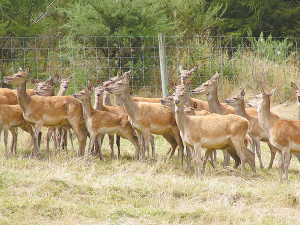Taranaki farmer fined $15,000 for illegal NAIT tag swapping
A Taranaki farmer and livestock agent who illegally swapped NAIT tags from cows infected with a bovine disease in an attempt to sell the cows has been fined $15,000.
 All cattle or deer must be fitted with a tag and registered in the NAIT scheme by the time the animal is 180 days old or before it is moved off farm.
All cattle or deer must be fitted with a tag and registered in the NAIT scheme by the time the animal is 180 days old or before it is moved off farm.
A Pukekohe deer farmer was recently fined $12,000 for not tagging 278 animals under the National Animal Identification and Tracing (NAIT) scheme.
Under the NAIT scheme all cattle or deer must be fitted with a tag and registered in the system by the time the animal is 180 days old, or before the animal is moved off farm.
Late last month, Lester Harrison Nixon was sentenced in the Papakura District Court on two charges under the National Animal Identification and Tracing Act, following a successful prosecution by Ministry for Primary Industries.
“NAIT tags are there to track and trace animals.
“They play a critical role in helping to ensure we can respond quickly and accurately in the event of a biosecurity incursion,” explained MPI acting national manager animal welfare and NAIT compliance, Brendon Mikkelsen.
“When people in charge of animals disregard their NAIT obligations they put the whole agricultural sector at risk.”
MPI said it made inquiries with Nixon about outstanding animal movements on his NAIT account in 2021. He has three properties registered in the NAIT database.
“We found Mr Nixon had made little effort to comply with the NAIT system, advising us that he does not tag his deer until just before they’re transported,” MPI reported. “He said he does not register the tags and that he had farmed for over 30 years without it (NAIT).”
During a search of one of Nixon’s properties where he had NAIT animals grazing, MPI found 132 deer not fitted with a NAIT tag and at another of his properties, a further 146 deer were also not fitted with tags.
In 2019, penalties in the NAIT Act increased tenfold to $100,000 for an individual, and up to $200,000 for a body corporate.
Mikkelsen says while receiving one of these penalties could hurt the bottom line for people in charge of animals, the inability to trace animals can have far reaching and serious consequences for everyone.
“The NAIT tag and registration system is only as effective as the information entered in. If you are unsure about what you need to do, reach out,” he added. “There is plenty of information, advice and support available.”
Tickets are now available for Beef + Lamb New Zealand’s (B+LNZ) Out the Gate, returning from 19-21 May 2026 at Te Pae, Christchurch.
Dairy Women's Network (DWN) is welcoming AgriHealth as a new partner.
Northland Field Days patron Ross Newlove remembers the inaugural field days he attended 40 years ago.
Southland farmer Murray Donald has been appointed as chair of Safer Farms, the industry-led organisation focused on reducing harm, injuries and fatalities in the agricultural sector.
National Lamb Day returns this Sunday, 15 February, with Beef + Lamb New Zealand Inc calling on Kiwis to fire up their barbecues and celebrate the people and the product that put New Zealand on the world map.
When it comes to arranging the sound system at Northland Field Days, no one does it better than Colin Finlayson.

OPINION: Here w go: the election date is set for November 7 and the politicians are out of the gate…
OPINION: ECan data was released a few days ago showing Canterbury farmers have made “giant strides on environmental performance”.